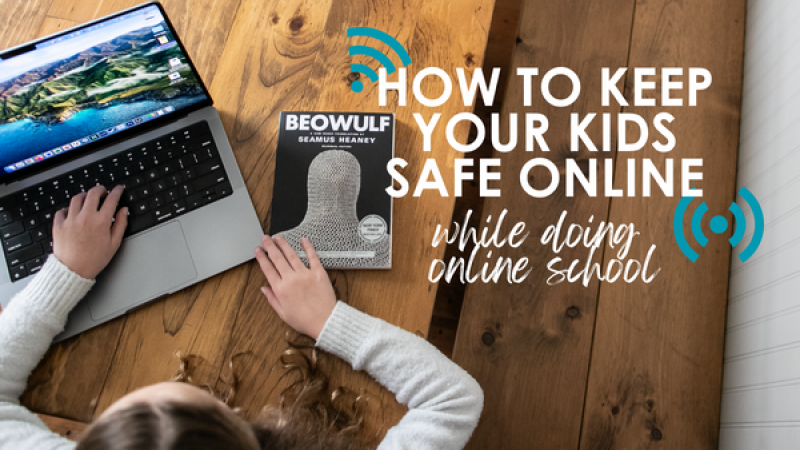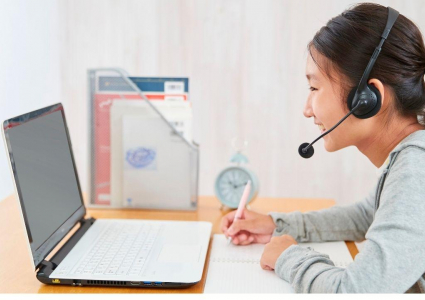Keeping Kids Safe Online While Doing Online School

When Constantine Levin’s first child is born in Tolstoy’s Anna Karenina, he acknowledges that a significant vulnerability has opened in his life. He knows that he would do anything to protect this child. All parents know this feeling, and we especially want to protect our children as they grow up. One of the areas where parents try to protect their children is online content and time. This is not just understandable but necessary. The online world is full of so much good and so much bad. In this post, I wanted to give three ways to help your child stay safe online and grow from accountability to freedom.
1. Give Accountability and Clear Standards of Behavior Online
When children are online, they enter a place where there is so much good and so much harmful material that we, as parents, need to focus on the deepest concerns and the most foundational issues. When your children are online, they need what all children need, whether online or not. They need accountability and clear standards. Maybe more bluntly, they need to know that God is watching and that their parents, as God’s representatives, are also watching.
Let’s start with clear standards. These standards provide an opportunity for children to earn trust. The ultimate goal of a parent is to know that their child is being trustworthy—when no one is watching. As a parent, you are called to be God’s minister in this area. You need to clarify limits: where you can and can not go, how long you can be online, and what your behavior needs to be like when you are in an online class. These are only examples.
Make sure your child knows these are not just negative rules; they are opportunities to earn trust and the freedom that comes with trust. Too often, parents micromanage technology without thinking about the real-world consequences of moving what should be a relational issue with your child to something like a police state. Accountability needs to start with a lot of looking over the shoulder, but the reason for looking is not to “zap” rule-breaking but to enable trust-building. Parents should be inclined to say, “I want you to have more freedom, but you must show me that you will use freedom wisely.”
When it comes to online classes, we all learned during Covid some things that are needed. First, students believe they can multitask, but school should be a time of singular focus. You can play Tetris, watch Netflix, and be in an online class simultaneously. If you are, however, I will guarantee which one of those will get the short end of the stick. Require children to learn online to have a space in which they learn. If the class is synchronous, make sure that their camera is on and that their faces are visible. If the class is asynchronous, require that the class is the only thing open on their computer. Being a student is a calling. It is actually one of the most important callings because it prepares us for all other callings.
This trust-building can start with apps like Covenant Eyes or Bark, but it should not end there. When children use freedom well, it should lead to more freedom. When they use freedom unwisely or sinfully, it should lead to temporary restrictions that provide another opportunity to rebuild trust and prove that they have the maturity to use freedom well. I recommend a few apps above, but nothing can substitute for time to talk with your children about their online classes and their life online.
2. Making Sure the Real World has Priority
This is meaningful to all children but most meaningful to children who are doing classes online. They need to understand that the online world is a place under the authority of Christ but that most of their responsibilities and most of their joy revolve around the real world. You take out trash in the real world; you open the door for a lady in the real world; you are baptized and take communion in the real world.
This does not mean that the online world is just an abstraction. You can show deference online. You can demonstrate respect. Help your children to have a vision for what it means to be a Christian online. (It looks a lot like being a Christian offline.)
Be careful of children becoming online-centric. They need time to develop relationships with their friends in their online classes, but this has to have its limit. This can’t take the place of playing outside on a sunny day, running a mile, flying a kite, or going fishing. If your child is struggling to have a non-online life, you need to wisely step in and find people for them to befriend in the real world.
3. Keeping Communication Open and Maintaining or Restoring Influence
Finally, you, as a parent, need to have a goal. The goal for your child is adulthood. This means making their own decisions without you being involved. This means keeping lines of communication open– we’re moving into uncomfortable situations for some Christian parents! At times, I find parents who believe they are going to nag or police their children into the Christian life. This is neither desirable nor possible. There is nothing that kills relationships like parental overreach.
In the long run, as your children earn trust, the most important issue is keeping lines of communication open. If they trust you, they will talk with you about what they see online. You can question whether their online choices fit with their Christian commitments. With the right child, one who has committed to Christ, you can be bold in this area: you’re asking the great Oceans 11 question, “Are you in or out?”
Finally, parents need to realize that their long-term goal is to influence rather than control. I hope that all of you have read Tedd Tripp’s classic on parenting Shepherding A Child’s Heart, or his teen version Age of Opportunity. Many of us read this when perplexed about how to biblically and effectively raise that first child. Here is a conversation I had with Pastor Tripp on Parenting Teens and Tweens.
Influence means that your children, as they grow toward adulthood, will be seeking your opinion. They will want to hear what you have to say. In the end, influence replaces authority.
The Internet has not surprised God, but it is a challenge for parents. The more things change, however, the more they remain the same. Parents need to lead their children from a place of accountability to a place of trust, freedom, and balance. Parents need to take control but remember that influence and eventual friendship rather than control and subservience is the end goal for their children.
P.S. If you would like to dig deeper into online safety, check out Protecting Young Eyes They are a wealth of information.






